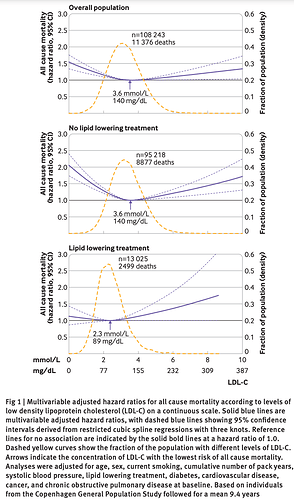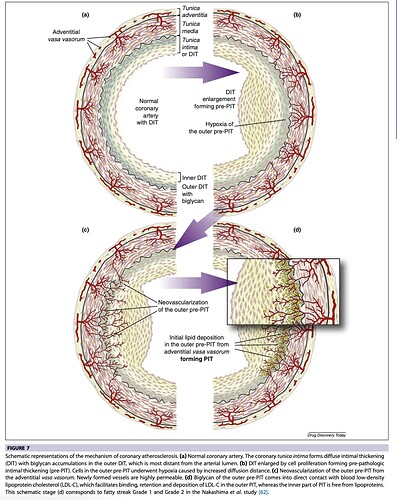Here’s a paper on ACM/LDL, with a lipid lowering intervention included.
Association between low density lipoprotein and all cause and cause specific mortality in Denmark: prospective cohort study
“Most studies investigating the relation between levels of LDL-C and the risk of all cause mortality have found no association, or an inverse association. Our study showed that the inverse association can be explained by the increased risk of all cause mortality associated with low levels of LDL-C rather than representing an actual decreased risk at high levels of LDL-C. Previous studies on the association between total cholesterol and risk of mortality showed a reversed J shaped or U shaped association, with the highest risk of all cause, cancer, and other mortality found at the lowest levels of total cholesterol, although positive, inverse, and no association with cardiovascular mortality have been reported. Also, we have recently found a similar U shaped association between levels of high density lipoprotein cholesterol and risk of all cause mortality. In our study, in individuals receiving lipid lowering treatment, the association between low levels of LDL-C and an increased risk of all cause, cancer, and other mortality was weaker than for individuals not receiving lipid lowering treatment. Any increase in levels of LDL-C, however, was associated with an increased risk of cardiovascular mortality but the 95% confidence intervals were wider and included a hazard ratio of 1.0 for all cause, cardiovascular, and other mortality at any concentration of LDL-C. This finding indirectly indicates a non-causal association and suggests that the reduction in levels of LDL-C caused by lipid lowering treatment does not explain the increased risk of mortality at low levels of LDL-C but rather low LDL-C levels is a predictor for mortality. Hence it would be incorrect to use our data as an argument against the use of lipid lowering treatment in the prevention of atherosclerotic cardiovascular disease and mortality. A recent meta-analysis of studies in individuals at high risk of atherosclerotic cardiovascular disease showed that more intensive lowering of levels of LDL-C was associated with a greater reduction in the risk of all cause and cardiovascular mortality. The remaining association between low levels of LDL-C and cancer mortality together with the association between very low levels of LDL-C and an increased risk of cancer (fatal and non-fatal) supports the hypothesis of a decrease in LDL-C levels because of debilitation and illness. Together, these results indicate the importance of assessing the absolute risk of atherosclerotic cardiovascular disease in deciding when to use lipid lowering treatment, rather than starting treatment based solely on a moderate increase in levels of LDL-C.”

